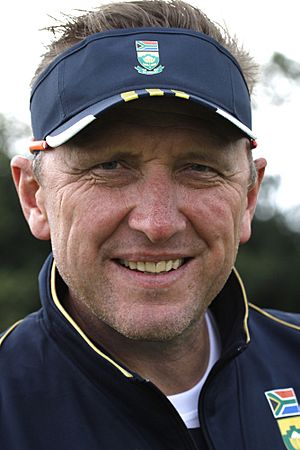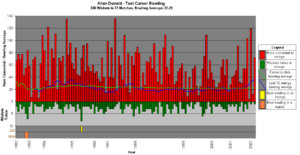Allan Donald facts for kids
 |
||||||||||||||||||||||||||||||||||||||||||||||||||||||||||||||||||
| Personal information | ||||||||||||||||||||||||||||||||||||||||||||||||||||||||||||||||||
|---|---|---|---|---|---|---|---|---|---|---|---|---|---|---|---|---|---|---|---|---|---|---|---|---|---|---|---|---|---|---|---|---|---|---|---|---|---|---|---|---|---|---|---|---|---|---|---|---|---|---|---|---|---|---|---|---|---|---|---|---|---|---|---|---|---|---|
| Full name |
Allan Anthony Donald
|
|||||||||||||||||||||||||||||||||||||||||||||||||||||||||||||||||
| Born | 20 October 1966 Bloemfontein, Orange Free State Province, South Africa |
|||||||||||||||||||||||||||||||||||||||||||||||||||||||||||||||||
| Nickname | White Lightning | |||||||||||||||||||||||||||||||||||||||||||||||||||||||||||||||||
| Height | 6 ft 3 in (191 cm) | |||||||||||||||||||||||||||||||||||||||||||||||||||||||||||||||||
| Batting | Right-handed | |||||||||||||||||||||||||||||||||||||||||||||||||||||||||||||||||
| Bowling | Right-arm fast | |||||||||||||||||||||||||||||||||||||||||||||||||||||||||||||||||
| Role | Bowler | |||||||||||||||||||||||||||||||||||||||||||||||||||||||||||||||||
| International information | ||||||||||||||||||||||||||||||||||||||||||||||||||||||||||||||||||
| National side |
|
|||||||||||||||||||||||||||||||||||||||||||||||||||||||||||||||||
| Test debut (cap 238) | 18 April 1992 v West Indies | |||||||||||||||||||||||||||||||||||||||||||||||||||||||||||||||||
| Last Test | 24 February 2002 v Australia | |||||||||||||||||||||||||||||||||||||||||||||||||||||||||||||||||
| ODI debut (cap 2) | 10 November 1991 v India | |||||||||||||||||||||||||||||||||||||||||||||||||||||||||||||||||
| Last ODI | 27 February 2003 v Canada | |||||||||||||||||||||||||||||||||||||||||||||||||||||||||||||||||
| ODI shirt no. | 10 | |||||||||||||||||||||||||||||||||||||||||||||||||||||||||||||||||
| Domestic team information | ||||||||||||||||||||||||||||||||||||||||||||||||||||||||||||||||||
| Years | Team | |||||||||||||||||||||||||||||||||||||||||||||||||||||||||||||||||
| 1985/86–2003/04 | Orange Free State/Free State | |||||||||||||||||||||||||||||||||||||||||||||||||||||||||||||||||
| 1985/86–1986/87 | Impalas | |||||||||||||||||||||||||||||||||||||||||||||||||||||||||||||||||
| 1987–2000 | Warwickshire | |||||||||||||||||||||||||||||||||||||||||||||||||||||||||||||||||
| 2002 | Worcestershire | |||||||||||||||||||||||||||||||||||||||||||||||||||||||||||||||||
| Head coaching information | ||||||||||||||||||||||||||||||||||||||||||||||||||||||||||||||||||
| Years | Team | |||||||||||||||||||||||||||||||||||||||||||||||||||||||||||||||||
| 2013 | Pune Warriors | |||||||||||||||||||||||||||||||||||||||||||||||||||||||||||||||||
| 2020–2022 | Knights | |||||||||||||||||||||||||||||||||||||||||||||||||||||||||||||||||
| Career statistics | ||||||||||||||||||||||||||||||||||||||||||||||||||||||||||||||||||
|
||||||||||||||||||||||||||||||||||||||||||||||||||||||||||||||||||
|
Source: Cricinfo, 4 July 2009
|
||||||||||||||||||||||||||||||||||||||||||||||||||||||||||||||||||
Allan Anthony Donald (born 20 October 1966) is a former South African cricketer and a respected bowling coach. He was nicknamed White Lightning because of his incredibly fast bowling. Many people think he is one of the greatest fast bowlers in the history of the South Africa national cricket team.
Donald was a key player when South Africa returned to international cricket in the 1990s. His speed and aggressive style helped his team become one of the best in the world. He was the first South African to take 300 wickets in Test cricket. He was also known for wearing white zinc cream on his face to protect his skin from the sun.
In 1998, Donald was ranked as the best Test bowler in the world by the ICC. He formed a famous bowling partnership with Shaun Pollock. Together, they were a major threat to batsmen everywhere. After retiring as a player, Donald became a coach for many teams, including international sides. In 2019, he was honored by being inducted into the ICC Cricket Hall of Fame.
Contents
Early Life and Career
As a child, Allan Donald loved sports and played cricket, soccer, and rugby. He went to the Technical High School in Bloemfontein. He was a talented young bowler. In one school match, he took an amazing 9 wickets for only 16 runs.
In 1984, he was chosen for the Orange Free State team. But a groin injury stopped him from playing in an important tournament called Nuffield Week. After recovering, he made his first-class debut in 1985 for Orange Free State. He was only 19 years old.
Donald also played for Warwickshire County Cricket Club in England for many years. He helped them win two trophies in the 1995 season. His time at Warwickshire was very successful, and he became a favorite player among the fans.
International Career
A Stunning Debut
Donald made his ODI debut for South Africa against India on 10 November 1991. This was a historic match because it was South Africa's first international game in 22 years. In his very first match, Donald took five wickets, including the famous batsmen Sachin Tendulkar and Ravi Shastri. This was an amazing start to his international career.
He made his Test debut on 18 April 1992, against the West Indies. This was another historic game, as it was South Africa's first Test match in over two decades. Donald performed well, taking six wickets in the match.
World Cup Appearances
Donald played in four World Cups for South Africa (1992, 1996, 1999, and 2003). In the 1992 Cricket World Cup, he was South Africa's top wicket-taker with 13 wickets. He helped his team reach the semi-finals in their first-ever World Cup.
During the 1996 Cricket World Cup, Donald had a memorable moment against the United Arab Emirates. Their captain, Sultan Zarawani, came out to bat wearing only a sunhat instead of a helmet. Donald, known for his fast bowling, bowled bouncers at him. One of them hit Zarawani on the head, but he bravely continued to bat before being dismissed.
Famous Rivalry with Michael Atherton
One of Donald's most famous moments came during a Test series in England in 1998. In the fourth Test at Trent Bridge, he had an intense bowling battle with England's captain, Michael Atherton.
Donald bowled incredibly fast and aggressively at Atherton, who stood his ground and refused to be intimidated. The two players exchanged words and stares in a classic showdown. Cricket fans still talk about this duel as one of the most exciting moments in Test history.
The 1999 World Cup Semi-Final
The 1999 Cricket World Cup semi-final against Australia is one of the most remembered matches in cricket history. South Africa needed just one run to win from the last four balls, with only one wicket left.
Lance Klusener was batting, and Donald was at the other end. Klusener hit the ball and ran, but there was a mix-up. Donald, watching the ball, didn't hear the call to run at first. By the time he started running, it was too late. He was run out, and the match ended in a tie. Because Australia had won their earlier match against South Africa, they went to the final. It was a heartbreaking end for Donald and his team.
Reaching 300 Test Wickets
On 19 November 2000, during a Test match against New Zealand, Donald became the first South African bowler to take 300 Test wickets. This was a huge achievement and cemented his place as a legend of the game.
He retired from Test cricket in 2002 and from all international cricket after the 2003 Cricket World Cup. When he retired, he held the South African records for the most wickets in both Test and ODI cricket. These records were later broken by Shaun Pollock and Dale Steyn.
Life After Playing Cricket
After retiring, Donald did not leave cricket. He worked as a commentator for the South African Broadcasting Corporation (SABC). He then became a highly respected bowling coach.
He has coached many teams around the world, including:
- The England cricket team
- The New Zealand cricket team
- Royal Challengers Bangalore in the Indian Premier League
- The South African national team
- The Bangladesh national cricket team
In 2017, he was appointed as an assistant coach at Kent County Cricket Club in England. He was also the head coach of the Knights in South Africa. His knowledge and experience have helped many young bowlers improve their skills.
Legacy
Allan Donald, or "White Lightning," is remembered as one of the most exciting and fearsome fast bowlers ever. His speed, skill, and competitive spirit made him a hero in South Africa and respected worldwide.
His intense battles with batsmen like Michael Atherton and his incredible performances in big matches are still talked about today. In 2019, his amazing career was officially recognized when he was inducted into the ICC Cricket Hall of Fame, an honor given to the greatest players in the history of cricket.
See also
 In Spanish: Allan Donald para niños
In Spanish: Allan Donald para niños
 | Emma Amos |
 | Edward Mitchell Bannister |
 | Larry D. Alexander |
 | Ernie Barnes |


